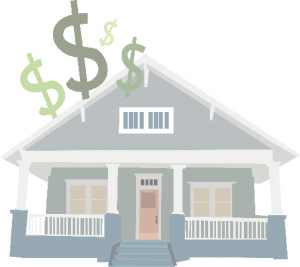As Americans, we live in the most forward-thinking, rewarding country in the world. The smell of fireworks still lingers from our celebration of Independence Day as we reflect upon the sacrifices made to ensure our way of life. Our forefathers envisioned a land of prosperity, where hard work was rewarded and everyone was free to pursue happiness.
However, freedom takes on various forms, and can be easily manipulated, especially when you talk about financial freedom. The Golden Rule of Finances goes like this: He who holds the gold makes the rules. Today, a better translation may be, He who holds the debt makes the rules. The home-mortgage market is a prime example. The average American taxpayer is taught that a home-mortgage is “good debt,” and is encouraged to use a mortgage interest deduction to decrease their taxes. I used to believe it sensible to pay your mortgage as scheduled in order to get this valuable deduction. Five years ago, I changed my mind. While spending time with some Canadian friends who were not yet 40, I learned that they only had five payments left before owning their $200,000 home. They further informed me that they were the last of their friends to pay off their home. I was shocked! I didn’t know a single person who paid off a mortgage by age 38.
It occurred to me that in Canada, there is no incentive – i.e. tax break – to influence homeowners to keep their mortgage debt. The Canadian government does not influence citizens regarding homeownership and debt planning, and perhaps that is why Canadians are motivated to pay off their mortgages early.
If you look at the numbers, it’s clear. For example, if you take out a $150,000 mortgage at 6% interest for 30 years and don’t try to pay it off early in order to get a tax break, you’ll have paid roughly $173,000 in interest alone at the end of the term! In all, you will have paid $323,000 for your $150,000 house. Does the government benefit?
No, they lose revenue because of the mortgage tax credit. Does the homeowner benefit? Not at all! The homeowner pays over double for their house! When you think about it, the only group to benefit when a mortgage goes full term is the bank that holds the debt. I wonder if banking lobbyists have anything to do with this longstanding tax deduction, since they alone reap the profit.
Let’s examine another option for this loan. You take out the same mortgage at the same interest rate but decrease the term to 15 years. True, your payment goes up from roughly $900 to $1,250 a month; however, you end up paying only $77,000 in interest. When the house is paid for in 15 years as opposed to 30, you saved nearly $100,000 of hard-earned cash. Let’s say you now take that $1,250 payment and invest it for retirement or savings accumulation for the next 15 years. Growth in a moderate portfolio with $1,250 per month at 7% for 15 years would amass to $396,202! So after 30 years, you could not only be free of a mortgage but could potentially be almost $400,000 richer. What an amazing difference!
As we ponder freedom at this time of year, let me encourage you – free yourself from “good debt.” I believe if you cannot afford the payment of a 15-year mortgage on the home you want, then it is not in your best interest to buy. You could be in a better place financially if you wait. Let’s stop letting the banks make the rules. Can you hear the scream of William Wallace from the movie, Braveheart? “FREEEEDOMMMM!”
800.338.4586 olvinvest.com The Durant 607 E 2nd Ave., Ste. 100 Flint, MI 48502 jlagore@olvinvest.com Securities offered through Sigma Financial Corporation, member FINRA/SIPC. Investment advisory services offered through SPC, a registered investment advisor. OLV Investment Group is independent of Sigma Financial Corporation and SPC.








